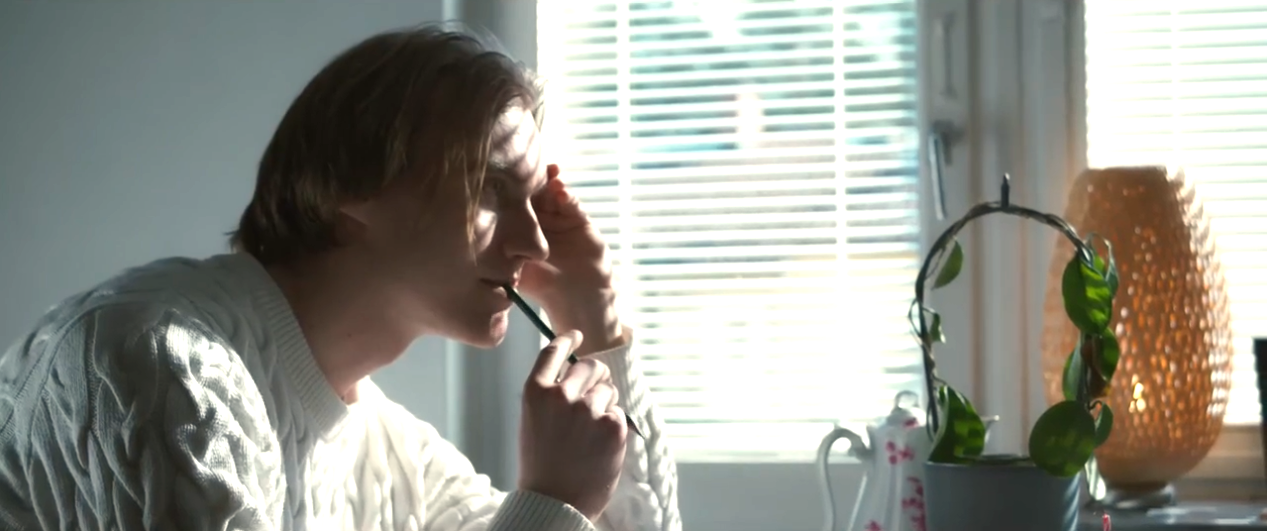by Douglas Messerli
Max Larsson (screenwriter and director) Hela byn har
lämnat mig för avgrunden (They Left for the Abyss) / 2024 [25 minutes]
Gay couple Felix (Casper Clöve) and Elliot (Jacob Ehlers) have left their
home in urban Sweden behind by moving to a small town on the border of Norway.
Here, living in “post-traumatic stress,”
Felix has retreated to a small, but comfortable cottage, where he keeps
the blinds closed and does not leave the house.
In fact, we don’t truly know, at
least at first, what the relationship between Felix and Elliot is, and why
Felix is still suffering an experience that Elliot evidently also shared. All
we know is that each day Elliot visits Felix, bringing provisions and sharing
his meals as they talk about the loss of a woman friend and Felix’ mental
well-being. Whether she was family, a lover, or a close friend, we never
discover; but from Felix’s troubled visions and dreams we sense that there was
an abduction, and the incident involved being tied up with duct tape.
But we can’t even be sure of
this, since a great deal of Swedish writer and director Max Larsson’s film is
cloaked either in metaphor or the strange therapy that it appears Elliot has
cooked up to jilt his lover out of his frightened isolation.
Before his next visit to Felix,
Elliot calls, himself seemingly in terror, to find out if urgently demanding to
know if his friend is alright. Upon arrival he describes that the entire center
of the village, all the major shops have been consumed by the hole, or as he
calls it, “the abyss,” calling up Nietzsche’s concept of “gazing into the
abyss,” the deepest part of oneself.
It is only that evening, in
total isolation, that the couple make love, supporting our suspicions that they
are indeed a gay couple with a past, which makes the dead woman even more
mysterious. Are the images that Felix keeps calling up also in code, do they
perhaps represent a wife he lost when he fell in love with Elliot; has she
perhaps done harm to herself? Perhaps I have just seen too many gay films at
this point, but since Larsson refuses to provide us with further information,
he leaves us only pure speculation to fill in the blanks of his story.
As the couple awake the next
morning, Elliot, somewhat inexplicably, says that he now must leave; and
despite Felix’ pleas to stay, leaves the house with door open as he enters his
car and drives away.
The act, in a sense, tests Felix’ love for him, as facing the open
doorway, he finally again enters the world, walking to the park only to find
the original small sink-hole the film has first shown us. There has been no
disaster in this small village, no horrors. Elliot’s act has simply brought Felix
out of his self-imposed isolation.
Where Elliot has gone, we don’t
know; but any sentimentalist such as myself can only imagine that he will soon
show up again, and the two men, having looked hard into their own beings, can
move on with their lives. Of course, the possibility remains that perhaps in
looking inward, Elliot has perceived that indeed he must leave this orphan of
the storm.
This film, in its missing
information, seems to be seeking a more profound story than many another LGBTQ
film; but we are not sure, in the end, whether this cinematic tale is as deeply
thoughtful as it pretends to be, as we sometimes get confused for its dearth of
information.
But the cinematography, acting,
and music are all quite excellent, and one can only commend Larsson’s work,
ultimately, for attempting to take on larger issues than the usual short gay
flick.
Los Angeles, June 24, 2025
Reprinted from My Queer Cinema blog (June 2025).






No comments:
Post a Comment